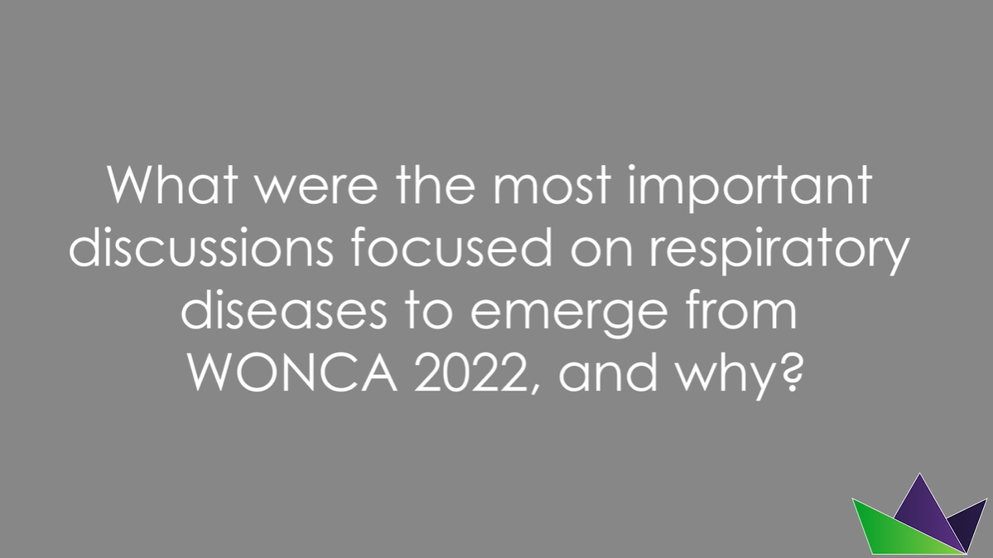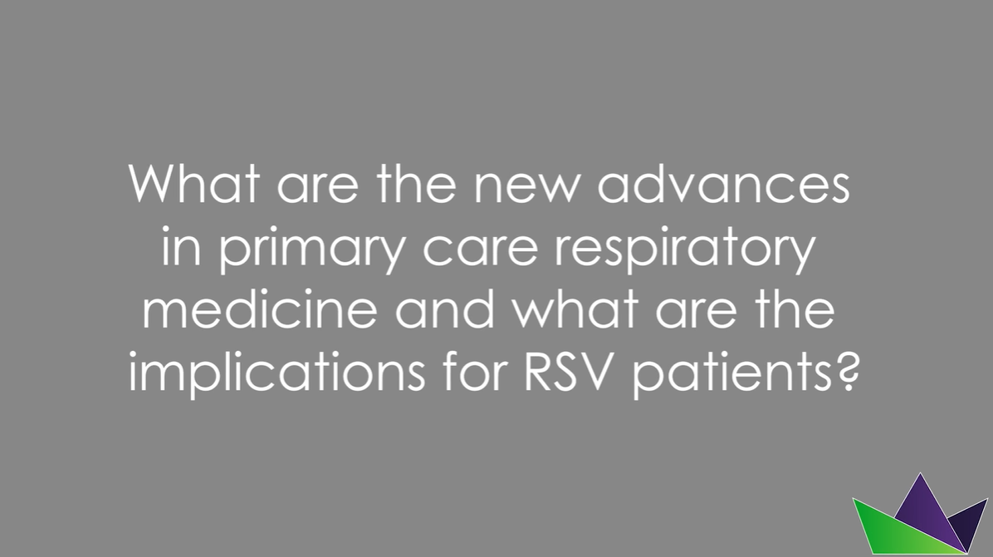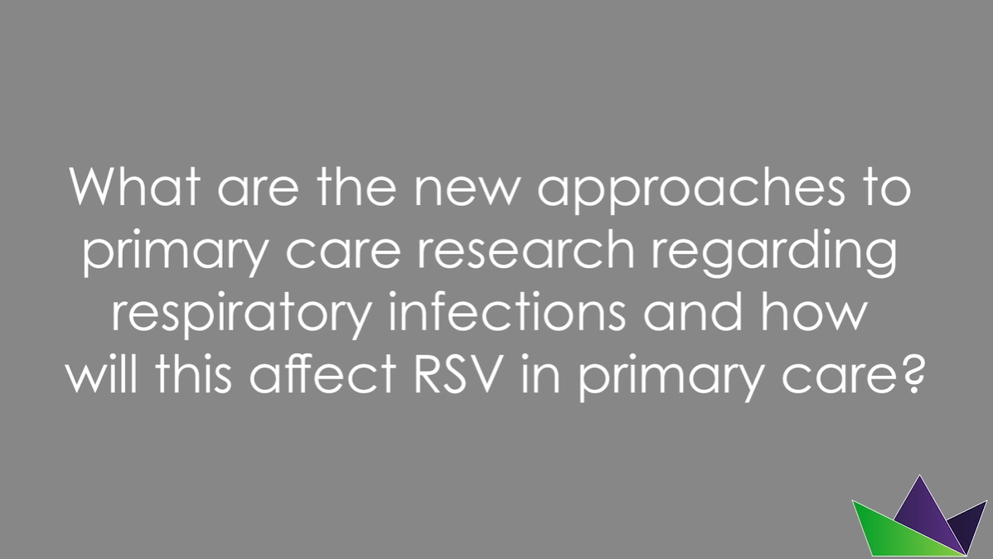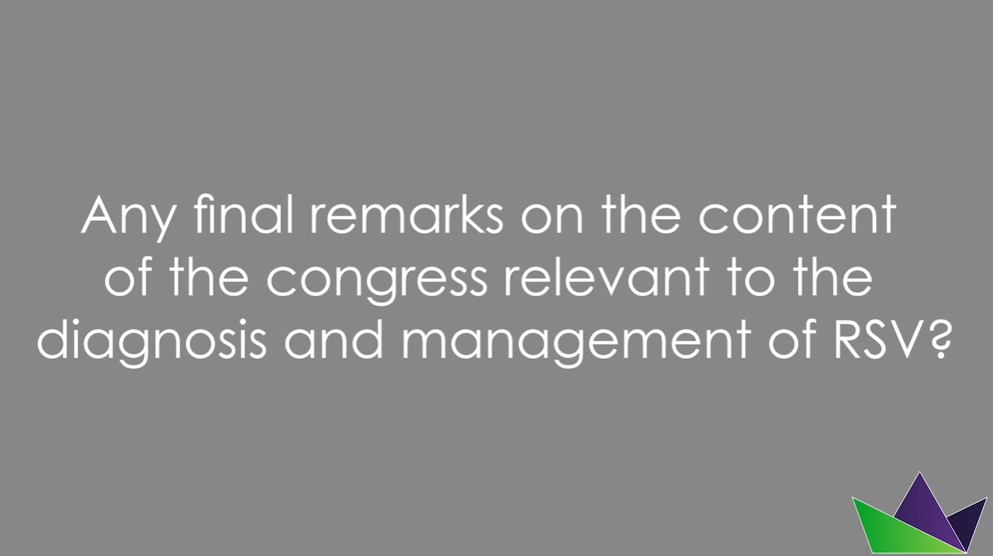
WONCA 2022 Congress Highlights
WONCA 2022 – Congress Highlights
Stay up to date with the latest information on infectious respiratory diseases from the 27th WONCA Europe Conference 2022, covering:
- The burden of RSV in adults
- The importance of timely RSV diagnosis in adults
- New approaches to clinical trials for respiratory diseases
Day One – RSV burden and diagnosis in adults
Respiratory syncytial virus (RSV) was the subject of a 45-minute lunchtime symposium organised by Janssen this first full day of the congress. This session, chaired by Dr Tristan Clark, had as its main objectives to discuss the prevalence of this disease in the older adult population, as well as raising awareness of the need of timely diagnosis in this sector of the population1.
Prevalence of RSV in older adults
RSV has been broadly studied as a major pathogen in infants. However, its burden in older populations is sometimes less well-known. Dr Stefania Maggi described how important it is to pay attention to the elderly population, and the burden that RSV has in these patients2.
During ageing, the immune system enters senescence, being less capable of fighting pathogens that otherwise do not pose an important threat. This is the case with RSV, a pathogen that can reinfect subjects from childhood to old age.
The clinical profile of this virus is typical for a respiratory pathogen – including cough, wheezing, sore throat and fever. When RSV appears in older adults, it can include other symptoms, such as hypoxia, tachycardia/tachypnoea, delirium and fatigue and is a major cause of hospital admissions.
Several studies shared by Dr Maggi shown that in England, RSV was estimated to account for an annual average of 71 respiratory admissions per 100,000 adult aged 65–74 and 251 admissions per 100,000 adults aged 75+3. In the US, the number of annual hospitalisation among adults older than 65 was around 177,000, accounting for 14,000 deaths in the same age group4. This study also indicated that RSV infection developed in 3–7% of healthy elderly patients annually; a percentage that increases to 4–10% for those older adults considered as part of a high-risk group.
Adults over 65 spend longer periods of time in hospital with RSV, increasing the healthcare cost associated with treating the disease
Not only the number of hospitalisations, but also the length of the hospital stay is increased in the elderly population. Another study indicated that the median hospital length of stay averaged over 5 European countries was 12 days for adults over 65 years old, whereas it was only 8 days for those younger than 655.
And these numbers only get worse in older adult patients with pre-existing conditions such as asthma, chronic obstructive pulmonary disease and congestive heart failure, and with concomitant bacterial infections.
People between 50 and 64 years of age have more risk factors which, in turn, has a deleterious effect on future RSV burden in this ageing population
Testing for RSV
Despite this burden of RSV in the elderly population, to date, there is no recommended treatment for RSV infection in adults over 65 years old and there is no vaccine available.
Dr Dexter Wiseman discussed the relevance of a prompt diagnosis as a way towards preventing the spread of RSV outbreaks, to minimise the risk in this elderly population6.
RSV is a seasonal virus with a normal cycle of 16–18 weeks, that used to have an annual profile comparable with influenza, peaking during the winter season. However, during the winter of 2020, in the peak of the COVID-19 pandemic, both influenza and RSV missed their season almost completely with levels close to zero. This event dramatically affected the cyclic nature of the appearance of both pathogens. There was a stronger effect on influenza, which almost disappeared during 2021. RSV rates instead shifted, and are currently out of phase with the latest peak reported in July 20217. This shift in RSV cycles makes even more important the need of correct diagnoses to identify outbreaks in a timely way.
However, diagnosing RSV has some difficulties. As the symptoms of the disease are often not distinguishable from other respiratory infectious diseases, and there is no dedicated treatment for it, it does not seem to be a priority and most cases go undiagnosed.
Polymerase chain reaction (PCR), considered the go-to technique for diagnosis, together with viral culture and serology, also has its limitations8. In addition to the high cost of the PCR panels that test for RSV, there is a propensity for this pathogen to replicate in the lower airways, making nasal swabbing potentially insufficient to obtain samples for diagnosis9.
Dr Wiseman also shared his opinion that more studies on prevalence and cost-effectiveness of diagnosing RSV in primary care are required in order to identify the correct pathway moving forward in order to help protect the elderly population, who are at risk of complications when infected with this pathogen.
Day Two – New approaches to clinical trials for respiratory diseases
Setting up a clinical trial is a tedious process that requires significant time, effort and staff. These barriers often prevent the involvement of practices that would otherwise like to participate.
In a symposium dedicated to investigating new ways to approach clinical trials in respiratory diseases, leading members of the General Practice Research on Infections Network (GRIN), Professor Chris Butler, Professor Gail Hayward, Professor Alike Van der Velden and Doctor Ben Saville shared their own experiences and perspectives10.
Professor Hayward highlighted the need of efficient set-up and design for clinical trials to allow both participation of interested sites unable to deal with the enormous administrative burden, and the obtention of more valuable information from community settings.
Out of the 9000 GP practices in the UK, not all of them can be research active. Setting up a research site is resource- and time-intensive.
Classic, umbrella and platform clinical trial designs
Dr Saville, an expert biostatistician, explained the differences between the known ‘classic’, traditional trial model, where there is one question to resolve in a homogeneous population (eg, is there any benefit of using treatment A instead of treatment B?) and the ‘umbrella’ trial model that considers multiple treatments and multiple populations (eg, same disease, multiple biomarkers that determine different population groups)11. This last option is planned and executed in a way that allows access to more detailed information about the relationships between different treatments and different populations all together as part of the same ‘umbrella’.
Umbrella trials were the first step into designing clinical trials for a constantly evolving clinical reality where more potentially relevant symptoms and biomarkers with treatment implications are constantly being found. Another step towards this aim are ‘platform’ trials.
Platform trials are adaptative designs meant to evaluate several interventions against a common control group. These depend on a Master Protocol, prepared at the beginning of the study, that includes all the information required to add new treatment arms to the trial, remove treatment options that are not showing clinical value, and introduce combinations of treatments based on ongoing results12-14. This type of trial can be run perpetually when properly planned, allowing clinicians to make decisions based on data in real time to improve the treatments under investigation.
It is easy to imagine the positive impact that these types of trials could have in the study of both diagnosis and treatment of any potential diseases, but also, their perpetual nature based on the Master Protocol provides a simpler system for study sites to set up.
PRINCIPLE and PANORAMIC studies
The Platform Randomised Trial of Treatments in the Community for Epidemic and Pandemic Illnesses (PRINCIPLE) aims to evaluate whether repurposed drugs can make a difference when used early in COVID-19 patients at risk of complications15.
Professor Butler shared his experience designing the trial while the world was facing lockdowns and most of the tools used to set up a study like this were unavailable. Some of the key requirements for a clinical trial, such as collection of consent or sampling were always done in person, which was not an option during the pandemic. This new situation called for an innovative approach and this is what the team working on PRINCIPLE achieved. With new online procedures to collect consent, identify and recruit patients, and introduce ‘self-testing’ as a method to collect samples, the platform was successfully set up.
PRINCIPLE has recruited more than 10,000 subjects in 2 years, becoming the largest trial of community therapeutics for COVID-19 worldwide until it was succeeded by PANORAMIC15
PRINCIPLE has tested, to date, five repurposed drugs – hydroxychloroquine, azithromycin, doxycycline, budesonide and colchicine – and is currently investigating another two – favipiravir and ivermectin15.
Once PRINCIPLE was up and running and providing an initial set of results, its focus became too narrow, and PANORAMIC was born. The Platform Adaptive trial of Novel antiviRals for eArly treatMentof COVID-19 in the Community (PANORAMIC) was designed to investigate in which patient profiles and new antiviral treatments for COVID-19 would reduce hospitalisations when provided in primary care16.
As of today, the number of subjects recruited to PLATFORM is over 26,000 and 65 sites from the UK are involved. PLATFORM is considered not only the largest trial of community therapeutics for COVID-19 in the world, but also the fastest ever recruiting for a trial of its kind in the UK17.
ECRAID – a window into the future of clinical trials
Professor Van der Velden introduced the European Clinical Research Alliance for Infectious Diseases (ECRAID) that was created in January 2022 as the successor to the European-funded project PREPARE (Platform for European Preparedness Against (Re-)emerging Epidemics)18.
The main objective is to establish long term relationships with sites across Europe to implement a Perpetual Observational Study (POS). This is an ongoing prospective and observational platform trial to improve diagnosis and treatment of infectious diseases in a perpetual manner. This study will be based on a minimalistic Master Protocol and a general ethical approval and will be modified as required via amendments that, in general, are approved more quickly and involve fewer administrative requirements. This system will allow for the integration of interventional studies, when required, as well as investigator-led or commercial studies.
The creation of long-term relationships across different sites in Europe and introduction of the POS system will ensure that clinical trials are ready and up to speed, with minimal set-up and results that are a better representation of the community
ECRAID-Prime is the first example of how to implement this model, as a platform trial for early treatment in primary care of COVID-19 patients. This trial is looking into promising treatments aiming to speed recovery and reduce complications by selecting putative agents via independent Joint Access Advisory Mechanisms (JAAM). Dr Van der Velden indicated that the next steps in the foreseeable future will include the possibility of expanding this trial to include other respiratory infectious diseases.
Day Three – Consequences of the COVID-19 pandemic in primary care
The surge of remote consultations in a post-COVID era
Telemedicine has been a recurring theme throughout WONCA 2022. Several symposia, presentation sessions and posters were dedicated to this relevant topic. Remote consultations in primary medicine have become a norm since the lockdowns triggered by the COVID-19 pandemic. After 2 years of experience, there is now enough information to analyse the impact of this new consultation model in different environments.
Remote consultations can improve waiting times and improve accessibility and convenience, but need to be done properly to avoid discrimination based on access to technologies and understanding of the available tools
A study presented by Dr Ana Luisa Neves raised the issues of reduced access to technology by those patients with poor digital literacy, care delays, misuse and a sense of clinical uncertainty19. She indicated that some strategies to implement in order to solve these obstacles would include training for patients and the creation of resources to improve health literacy, preparation of guidelines for remote care and improved remote triage.
Considerations regarding ethics were raised by Dr Tania Moerenhout, who discussed the challenges that are faced when moving towards virtual consultations20. According to her study, there is a risk of compromising continuity of care as well as equity, but she also emphasized the increase in accessibility and convenience, recommending a proactive and comprehensive approach towards increased virtual consultations to ensure appropriate service.
Dr Catherine Clifford’s clinic based in Ireland identified that foreigners had a harder time understanding medical alerts due to COVID-1921. Her group came up with a way to support these patients. During the pandemic, a volunteer network of international healthcare workers created video messages in more than thirty languages explaining the COVID-19 pandemic, the steps to follow and the vaccination programmes. This interesting initiative survived beyond the COVID-19 crisis and, since then, new multilingual videos have been produced on other health topics of interest including instructions to access healthcare in Ireland, screening services and antenatal care.
To address healthcare access to foreigners, a group international volunteers is preparing multilingual videos to help immigrants in Ireland understand both healthcare systems and their rights
Moving one step further in the digitalisation and democratisation of the healthcare system, the NHS announced that from April 2022, all patients with online records access accounts would be able to review their medical records. A study presented by Dr Brian McMillan investigated the benefits and disadvantages of opening access to these medical records by interviewing clinical and non-clinical primary care staff22. A preliminary analysis of the results obtained identified some concerns regarding the safety of providing access to this information – for example, an access breach by abusive partners or others, or the potential distress caused in patients from a result displayed in their records. However, broadly, such access is considered positive, in light of the potential efficiency in terms of shortening waiting times for patients to access their results as well as the improvement and support of a system that provides more autonomy to patients. The principal conclusion that McMillan’s team extracted from the study was the need for the health care professionals (HCPs) to adapt and ensure that the way medical records are written is not only clear in message, but also not overly alarming, to avoid unnecessary distress in patient as much as possible.
HCP mental health
The COVID-19 pandemic was a stressful and challenging situation for clinicians of all specialties and countries. Increasing numbers of patients, restrictions and reallocation of material and staff proved a very demanding stress test. How to ensure that HCPs from different specialties and even medical students are maintaining good mental health was also debated at WONCA 2022. A wide variety of international professionals shared their concern about the increase in the burden and pressure placed on clinicians at every level, from general practitioners to specialists, and even students in their final years of study. Dr Susanne Caesar emphasized the importance of focusing on health and wellbeing as essential for maintaining safe and effective patient care23.
Medical students have been reported as being seriously affected by stress, which hijacks their mental health, sleep and eating habits
A study presented by Jakub Tchórzewski indicated how 52% of the medical students of selected Polish universities reported anxiety disorders, 75% sleep disorders, 46% eating disorders and 15% diagnosed with depression24. These results indicate that medical students have high levels of stress and the author recommended implementing measures to raise awareness of the prevalence of mental disorders in medical students to address the situation.
Dr Miriam Rey Seoane introduced the ‘count on me’ project born in Barcelona that aims to generate a space to support international HCPs. This projects provides a resource where HCPs can discuss their mental health issues and support each other in a neutral environment, helping them to overcome burnout. As part of this project, groups of ten people come together online once a month to support each other and identify strategies to support a healthier practice.
One final presentation focused on improving the mental health and wellbeing of HCPs was by Dr Nena Kopcavar Gucek25. She discussed the relevance of promoting resilience in primary care through the development of new skills and methods of self-care and highlighting some useful techniques, such as breathing exercises and mindfulness.
Expert Interview – Dr Stefania Maggi
Join Doctor Stefania Maggi in this series of videos to hear about important topics relating to RSV diagnosis and treatment that were discussed at the WONCA 2022 congress.
References
- Clark T, (chair), Maggi S, Wiseman D. The burden of RSV: An unseen epidemic in older adults. Presented at the 27th WONCA Europe Conference 2022, 29 June. London.
- Maggi S. RSV in older adults: A prevalence of relevance. Presented at the 27th WONCA Europe Conference 2022, 29 June. London.
- Sharp A, Minaji M, Panagiotopoulos N, Reeves R, Charlett A, Pebody R. Estimating the burden of adult hospital admissions due to RSV and other respiratory pathogens in England. Influenza Other Respir Viruses. 2022;16(1):125-131.
- Falsey AR, Hennessey PA, Formica MA, Cox C, Walsh EE. Respiratory syncytial virus infection in elderly and high-risk adults. N Engl J Med. 2005;352(17):1749-1759.
- Launay O, Thalhammer F, Harrer T, Cheret A, De La Rosa G, Sander I, et al. Respiratory syncytial virus (RSV) disease in hospitalised adults in Europe: comparison of retrospective patient chart reviews of adults =65 (=65y) and. European Respiratory Journal. 2018;52(suppl 62):PA2030.
- Wiseman D. Testing times: Identifying RSV in clinical practice. Presented at the 27th WONCA Europe Conference 2022, 29 June. London.
- Mondal P, Sinharoy A, Gope S. The Influence of COVID-19 on Influenza and Respiratory Syncytial Virus Activities. Infectious Disease Reports. 2022;14(1):134-141.
- Falsey AR, Walsh EE. Respiratory syncytial virus infection in adults. Clin Microbiol Rev. 2000;13(3):371-384.
- Carvajal JJ, Avellaneda AM, Salazar-Ardiles C, Maya JE, Kalergis AM, Lay MK. Host Components Contributing to Respiratory Syncytial Virus Pathogenesis. Front Immunol. 2019;10:2152.
- Hayward G, Saville B, Van der Velden A, Butler C. Academic General Practice: WONCA Network (GRIN). Presented at the 27th WONCA Europe Conference 2022, 29 June. London.
- Park JJH, Siden E, Zoratti MJ, Dron L, Harari O, Singer J, et al. Systematic review of basket trials, umbrella trials, and platform trials: a landscape analysis of master protocols. Trials. 2019;20(1):572.
- Berry SM, Connor JT, Lewis RJ. The platform trial: an efficient strategy for evaluating multiple treatments. JAMA. 2015;313(16):1619-1620.
- Woodcock J, LaVange LM. Master Protocols to Study Multiple Therapies, Multiple Diseases, or Both. New England Journal of Medicine. 2017;377(1):62-70.
- Saville BR, Berry SM. Efficiencies of platform clinical trials: A vision of the future. Clin Trials. 2016;13(3):358-366.
- PRINCIPLE. Platform Randomised Trial of Treatments in the Community for Epidemic and Pandemic Illnesses. https://www.principletrial.org. Accessed 1 July 2022.
- PANORAMIC. Platform Adaptive trial of NOvel antiviRals for eArly treatMent of COVID-19 In the Community. https://www.panoramictrial.org. Accessed 1 July 2022.
- PANORAMIC. New antiviral, Paxlovid, added to PANORAMIC study. https://www.panoramictrial.org/news/new-antiviral-paxlovid-added-to-panoramic-study. Accessed 1 July 2022.
- ECRAID. European Clinical Research Alliance on Infectious Diseases. https://www.ecraid.eu. Accessed 1 July 2022.
- Neves AL. Remote consultations in primary care: safety implications and strategies for safer use by patients and healthcare providers. Presented at the 27th WONCA Europe Conference 2022, 1 July. London.
- Moerenhout T. How can we make virtual care good care? An ethical analysis of virtual-only consultation services and lessons for general practice. Presented at the 27th WONCA Europe Conference 2022, 1 July. London.
- Clifford C. Multilingual video messages, accessible information for patients and efficient for service providers. Presented at the 27th WONCA Europe Conference 2022, 1 July. London.
- McMillan B. The views and experiences of primary care staff on patients having online access to their electronic primary care health record. Presented at the 27th WONCA Europe Conference 2022, 29 June. London.
- Caesar S. Why a focus on the health and wellbeing of clinicians is always warranted in appraisal. Presented at the 27th WONCA Europe Conference 2022, 29 June. London.
- Tchórzewski J. Mental well-being among students of selected medical universities in Poland. The role of a family physican. Presented at the 27th WONCA Europe Conference 2022, 1 July. London.
- Gucek NK. Just to survive or to thrive? Workshop to promote resilience in primary care. Presented at the 27th WONCA Europe Conference 2022, 29 June. London.
This content has been developed independently by Medthority who previously received educational funding in order to help provide its healthcare professional members with access to the highest quality medical and scientific information, education and associated relevant content.
Developed for Medthority by EPG Health. This content has been developed independently of the sponsors who have had no editorial input into the content. EPG Health received unrestricted educational funding from the sponsor in order to help provide its healthcare professional members with access to the highest quality medical and scientific information, education and associated relevant content. This content is intended for healthcare professionals only.








